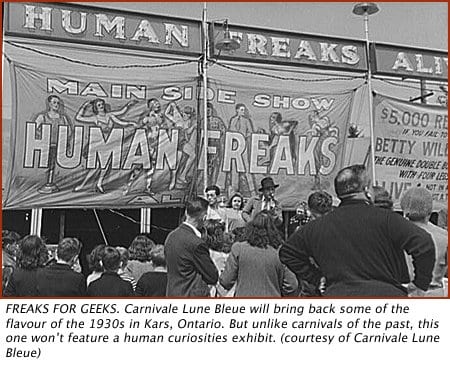***
Canada hid bearded ladies in remote asylums, but elsewhere we displayed them as human curiosities. Canada treated people with unusual physical attributes — paradoxically — as a cause for fear and as crowd-pleasing attractions. Nowhere was that contradictory attitude more apparent than in the carnival.
Jan-Rok Arcand is a Montreal carnival historian. He talks about the exhibition of human curiosities as “a sort of exoticism.” But the moral questions are tough for him to answer.
“Was this just exhibitionism, or was it in a way sensitizing people?” says Arcand.
Bearded ladies and half-man-half-woman sideshows were lined up with various grotesqueries — men with horse-hoof feet, women with bizarre tumors. In the quest to find the next big thing, carnivals sent scouts across the country to find new acts. In some cases, the people were literally bought from family members who were unwilling or unable to take care of them. In other cases, the association was voluntary.
“They found a place to be alive and have some kind of living,” says Arcand. “They were a ghetto unto themselves.”
Through the first half of the 20th century and beyond, the alternative for many — including intersex people — was hospitalization.
In Baie-St-Paul, Quebec, an asylum similar to facilities for the mentally ill “treated” people with physical abnormalities, says Arcand, but similar hospitals operated across the continent.
“It was a place for all the people who had strange bodies — right up to the 1950s,” he says. “They were hiding these people. On one hand, it was a curiosity, but on the other, they we hiding them.”
In Aug, a team will build a vintage 1930s carnival in Kars, Ontario, about 30 minutes from Ottawa. While there will be no human curiosities exhibit, Carnivale Lune Bleue will feature fire-eaters, sword-swallowers and deadly snakes — a contemporary sideshow without the moral queasiness a human curiosity exhibit would create.
“Its whole value is in bringing back some sort of souvenir, some of the flavour that is gone,” says Arcand.


 Why you can trust Xtra
Why you can trust Xtra


